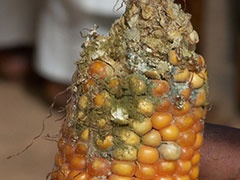Aflatoxins—naturally occurring fungal toxins that contaminate grains and other crops— pose one of the world’s most significant food safety risks, particularly in developing countries. On November 5, IFPRI will launch a series of 19 policy briefs on managing aflatoxins as part of IFPRI’s 2020 Vision Initiative and under the auspices of the IFPRI-led CGIAR Research Program on Agriculture for Nutrition and Health (A4NH).
Understanding and managing deadly aflatoxins can directly improve food safety for vulnerable people worldwide. However, doing so requires a varied approach because aflatoxins affect human health, trade, animal health, and nutrition, according to co-authors Laurian Unnevehr, Senior Research Fellow at IFPRI, and Delia Grace, veterinary epidemiologist at the International Livestock Research Institute (ILRI). “That’s why we invited briefs on a wide variety of aflatoxin-related topics, from health outcomes to markets, because aflatoxin is a multifaceted challenge,” said Unnevehr.
Starting with an overview of known health risks, the series examines aflatoxin control from an international trade context to see how market incentives can provide solutions. Since aflatoxins can be toxic—even at very low levels—several briefs examine effective detection and diagnostic technologies. The brief by Sheryl Schneider, Stéphane Méaux, and Eleni Pantiora, all from the World Food Programme, emphasizes preventative measures in aflatoxin control through the provision of another new technology: Blue Boxes, portable grain-testing tools that allow for on-the-spot testing of crops at any stage of the supply chain.
Another brief by George Mahuku, Marilyn Warburton, Dan Makumbi, and Felix SanVicente, goes a step further and discusses the development of aflatoxin host-resistance in maize plants. These aflatoxin management approaches, combined with an enabling policy and regulatory environment, have the potential to increase food safety while also improving human and animal health.
The series concludes with cases from several CGIAR centers that demonstrate the use of new technologies and detection methods to help manage the complex problem. The briefs respond to the policy community’s increasing interest in aflatoxins, offering a variety of perspectives on addressing the health and environmental risks they pose. “The series provides a good way of bringing together up-to-date information on aflatoxins by experts,” said Grace, who also serves as the A4NH theme leader for food safety.







